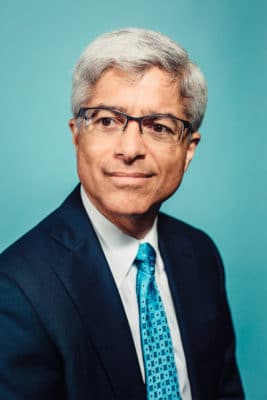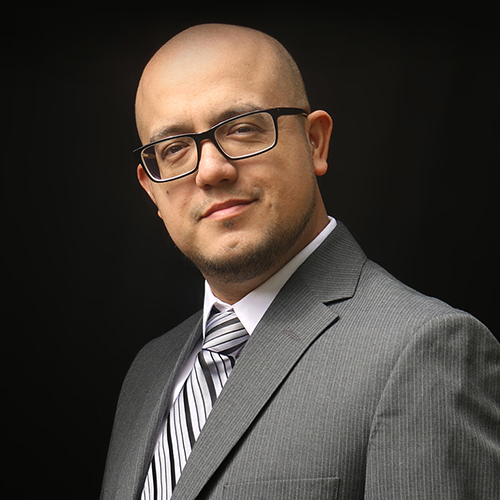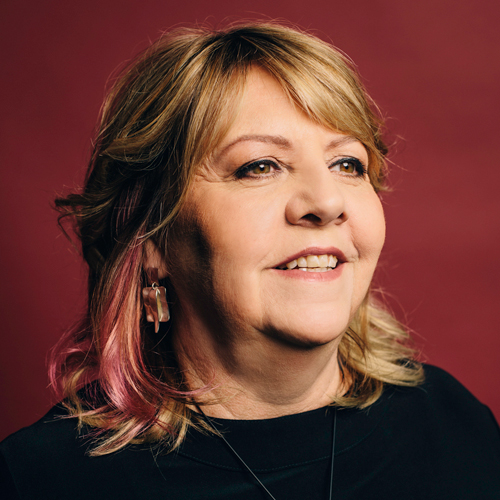
Edison International’s primary focus is figuring out how to provide affordable power in the cleanest way possible. Since CEO Pedro Pizarro took the helm of the energy giant, Edison’s average monthly residential electric bill has been $91—well below the national average of $123. Pizarro, however, is just getting started. “The state pushes us, our customers push us, our employees push us,” he says.
Although Pizarro has been in this global role less than a year, he says the transition has been smooth. He was previously president of Southern California Edison and during his tenure, the company committed to using 50 percent renewable energy for power by the year 2030. Already, renewable energy accounts for more than 28 percent of the company’s total energy delivered. It’s showing no signs of slowing down when it comes to going green.
Edison has been a pioneer of renewable projects in California and hopes to work more closely with small renewable energy providers in the future. Because a key component of green energy is having an efficient grid that can support various inputs, the company is constantly modernizing their electricity delivery systems to meet their long-term goals. To date, they’ve connected more than 200,000 solar customers to the grid.
Pointing out that California has led the way in energy innovation since wind turbines and older solar projects, Pizarro is proud to support the state’s commitment to the environment. On the wall of his office are historic photos of some of the state’s original high-voltage emission lines.
For Edison International, green is more than the way they do business. The company is also committed to individual sustainability initiatives, working to educate their customers on ways to save power and energy.
As Edison’s customers balance economic and environmental concerns when it comes to electricity, the company takes a holistic approach that strives to modernize and update the grid, while keeping power affordable. It is a tricky balance, but Pizarro is confident that Edison is leading the way for utilities.
To continue fostering environmentalism and renewable energies, the company is transforming into two-way power grids, which would better regulate fluctuating resources and customer demands.
For Pizarro, an added bonus of Edison’s commitment to environmentalism is that Edison International’s green initiatives have helped to attract and retain younger workers. “For innovation to exist in a 130-year-old company, there needs to be a diversity of voices and opinions,” Pizarro says.
One initiative the CEO is particularly proud of is an informal, company-wide effort to encourage new ideas. Employees create their own teams and can pitch directly to management. With about 12,500 full-time employees, fostering an environment where all workers’ voices and ideas can be heard is no small feat.
“By helping cut through the tape and internal layers, we are encouraging individuals and small teams to come up with new ideas,” Pizarro says.
Creating a space where employees feel empowered to speak up is essential to Pizarro’s management style. He hopes that employees feel like co-owners.
“We are working hard to create ways for employees to drive change and really speak up to bring ideas to the forefront,” he says.
“As you age as a company, as you get larger, it can make it harder to move a big ship. When you introduce ways for employees to have a voice and drive change, the culture changes.”
For Pizarro, an essential aspect of this innovation is having a diverse workforce. “It makes a lot of sense for our company to look like our customers,” he says.
In addition, Pizarro says that to solve complex problems like delivering renewable energy in an efficient, cost-effective manner, the company needs diversity of thought. It is not enough for his employees to be smart, they need to be from different backgrounds, so that all types of solutions are brought to the table. “How do we continue to ensure we breed new talent?” he asks.
“By helping cut through the tape and internal layers, we are encouraging individuals and small teams to come up with new ideas.”
Pedro Pizarro
Edison’s commitment to diversity is obvious even when looking at the boardroom.
Although company initiatives target inclusiveness at all levels of employment, they are particularly proud of having board members from all backgrounds, as that is not the case for most S&P 500 companies. By fostering diversity at the top, the company hopes that their message trickles down to all levels.
The company is focused on recruitment as well as talent identification, training, and coaching. “How can we build a company that has the doors wide open and then allows the talent to develop itself?” Pizarro asks.
Edison even takes that commitment to diversity outside of the company, striving to partner and work with a diverse supplier base. In practice, this means working with small businesses in underserved communities, making sure that they are up to speed and can work within Edison’s framework. “We work it pretty hard,” Pizarro says.
As far as his own career successes, Pizarro says that having a unique background and vast experience in science and engineering has helped to propel him forward.
“Mine is a way of thinking that comes from the scientific method,” says Pizarro, who comes from a hard-working family from Puerto Rico. “My method helps me relate to a company that is so technology-driven.”
Pizarro rounded out his PhD in chemistry by working in various industries and roles, including management consulting, business development, and operations.
“Sometimes opportunity comes knocking and you don’t even know it,” Pizarro says. “The key is to always be working on something concrete to improve yourself.”
Pizarro says it is important to always look five to ten years down the line and consider the skills that you will need to achieve those goals. Beyond the day-to-day, a person’s job is to continually improve oneself and work towards a long-term goal, even if the goal is unknown. Pizarro himself is more motivated by Edison’s long-term goals than by anything else.
“Take a job you think you’re going to love,” he says. “You can’t do anything just for the money. Money isn’t enough to motivate you.”
Edison International
By the Numbers
Southern California Edison delivered 86 billion kwh of electricity to 5 million customer accounts in 2016.
Across America, Edison Energy Group has more than 300 solar projects, producing 178 million kwh of solar energy in 20 states.
Southern California Edison is one of the nation’s largest electric utility providers, with a 50,000-square-mile service area. They’ve invested heavily in their infrastructure, with more than 103,000 miles of transmission and distribution lines.
In 2016, nearly 45% of Southern California Edison’s total procurement spend was with diverse suppliers.
Source: www.edison.com

